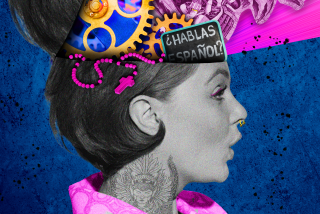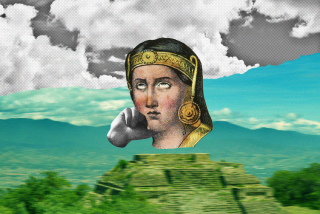The Errant Enigma From Genoa : THE CONQUEST OF PARADISE; Christopher Columbus and the Columbian Legacy <i> By Kirkpatrick Sale (Alfred A. Knopf: $24.95; 384 pp., with three drawings; 0-394-57429-X/LC 90-53069) </i>
- Share via
By 1892, when America celebrated the 400th anniversary of Columbus’ discovery of the New World, the obsessive explorer’s name had become synonymous with progress, even virtue. In New York City, a five-day celebration featured a lavish, nighttime parade, while in Chicago, an exhibition brought together the finest American artists from around theworld. And throughout America, rivers, bridges, parks, mountains, colleges, squares, lakes and streets bore the name “Columbus.” Only George Washington’s name, in fact, had been more pervasive.
A century later, “Columbus” continues to dominate the geopolitical map of the United States, although today, a minority has come to view the man as a symbol of racial guilt and environmental destruction.
In his recent essay, “Columbus and the Origins of Racism in the Americas,” historian Jan Carew describes the arrival of Columbus in the New World as a “Holocaust which . . . has been glossed over, ignored and rationalized as an ‘inevitable’ phenomenon in the exotica of European expansionism.” This same “holocaust,” other revisionist historians have pointed out, sought to replace a people who respected, in fact worshiped, nature with a people for whom nature represented little more than land to be excavated in the search for mineral wealth, or trees to be razed if they dared to stand in the way of “progress.”
This is not to say that ours is the first age to cast doubts on the benevolence of the Columbian legacy: In 1768, for example, Cornelius Depauw, a Massachussetts industrialist turned philosopher, wrote that “the discovery of the New World has been the most disastrous event in the history of mankind.” He was referring to the resurgence of slavery brought on by the Spanish and started, for all intents and purposes, by Columbus himself.
But as we approach the 1992 quincentennial of his first voyage to America, the debate no doubt will intensify.
Hero or villain? Clearly Kirkpatrick Sale’s “The Conquest of Paradise” is just one of what promises to be a veritable rain forest of books on the life and achievements of this most enigmatic of men. Columbus toys with both those who adore him and those who loathe him, evoking the most wildly contentious responses from historians who are otherwise noted for their sobriety of judgment. Carew, in his anti-Columbus essay, argues thepoint that “Columbus was a genius at navigation.” Bjorn Landstrom, another respected historian, has claimed that Columbus “was convinced until the very end that he had reached India, and did not realize that he had discovered a New World.” Hardly the hallmark of navigational genius.
Setting off in the “spirit of reassessment,” Sale journeys with Columbus on his first voyage in 1492, and travels with him until his death in Spain about 14 years later. As his subtitle, “Christopher Columbus and the Columbian Legacy,” informs us, his goal is to reassess both Columbus the man and the legacy of the Columbian achievement.
The narrative employed is a fusion of authorial voice, italicized passages of historical scene-setting, and brief extracts from the admiral’s logs. This triple narrative is heavily annotated with asterisked footnotes, and numbered references to notes at the back of the book. Clearly, this is a work of considerable research, drawing together the evidence of countless previous biographies and histories, and aiming to unravel the lies, myths and half-truths before attempting to weave a clearer and more authoritative tapestry. But does Sale’s “reassessment” throw any new light on the man named Columbus? Does it, indeed, help us to understand his legacy?
The reassessment is dogged by a number of obstacles, some of which have caused other writers to stumble and fall, but a few of which are clearly of the author’s own making. That we know so little about Columbus’ life presents an almost-insuperable problem for the would-be biographer. Sale admits that in the last century alone there have been 253 scholarly articles and books on the relatively straightforward question of Columbus’ birthplace.
Rival claims range from Poland to France, Majorca to Greece. Most agree on Genoa, but by no means all. Furthermore, before Columbus began to petition the Spanish majesties in about 1486 (when one might reasonably suppose Columbus to have been a man in his middle 30s), there is hardly anything extant about his life.
Incredibly enough, even the explorer’s name is subject to debate. Born (presumably) in Genoa with the name “Cristoforo Colombo” or “Christofferus De Columbo,” he became either “Christobal Colom” or “Christovam Colombo” in Portugal, and then “Cristobal Colon” in Spain. The riddle of the origins of Columbus--his early years, his adolescence, his youth and his hopes and fears as a young man--defeats Sale as it has defeated many before him. He blandly suggests that Columbus was “a man truly without a past that he could define, without a home, or roots, or family, without even a sense of love, of place.”
The author concludes with the inexplicable: “His early years are dark because, in a sense, they are empty.” Surely, in a major work on Columbus, we deserve a little better than this.
In order to obviate the lack of reliable information on Columbus’ life, Sale resorts to extensive scene-setting. We are treated to a chapter about violence, disease and famine, and yet another on everything from the flora and fauna of the late Middle Ages to the tendency toward ‘technophilia’ in 15th-Century Europe. As compelling and well-written as much of this information is, one cannot help but suspect that its inclusion at suchlength does little but weaken the central narrative drive of the book. When the author returns to Columbus and his journeys, the tempo picks up, but sadly the style often fails. The tone becomes flip, the prose slack.
“Very well: landfall. The much-sought prize. The question is--the first question, anyway, directly related to the nagging one about their intended destination--where did they suppose they were?”
When Sale describes Columbus’ later, incident-packed, dramatic years, however, the book moves easily and swiftly.
On his first trip to the New World, Columbus was convinced that he had found heaven on Earth. He had read in Pierre D’Ailly’s “Imago Mundi” that the Garden of Eden had to be in a warm climate on the other side of the Equator, and so was enraptured by everything he saw from the moment he arrived. “They are very gentle,” he wrote of the indigenous population, “and know nothing of evil.” When he returned a year later to find that the settlement and crew he left behind had been wiped out by the local chiefs, however, his dream darkened. The same people who, as he wrote in 1492, “loved their neighbors as they loved themselves,” he began to call “cruel and hostile savages.”
(In his book “The Tears of the White Man,” French journalist Pascal Bruckner suggests that Columbus’ disappointment was especially deep because the religious texts that guided him led him to expect a new Garden of Eden. “The Caribbean Indian was a blank slate upon which the Conquistadors drew a picture of the Christian revelation,” Bruckner wrote. “They were given the formidable privilege of being perfect, but because of this were in danger of being designated savages if they failed in their mission.”)
Thus began Columbus’ battles not only with the local population but with his own crew--battles that led Spain’s King Ferdinand and Queen Isabella to strip Columbus of his administrative powers. Refusing to obey the newly appointed governor, Columbus eventually was taken back to Spain in chains. Seeing the king and queen upon his return, Columbus, still in shackles, fell on his knees and burst into tears.
Columbus pleaded for a chance to undertake a fourth voyage, certain that he was on the verge of discovering the gold he promised the monarchs he would discover. But this final voyage was a disaster, due to inclement weather, the Please Turn to Page 11 admiral’s stubborn unwillingness to follow the royal instructions to sail south, and to his own failing health. Columbus returned to Spain, where he died a wealthy but somewhat bitter man. His contemporaries never fully acknowledged his true stature, but there is evidence to show that Columbus was aware of the magnitude and import of his achievements.
Sale’s reassessment of Columbus is most valuable for shedding sensible light on the veracity of the claims and counterclaims of previous historians and scholars. He dismisses some wrongheaded propositions, such as Simon Wiesenthal’s argument that Columbus was one of the Jews expelled from Spain in 1492. Beyond this, however, he has little new to say about Columbus, and his diversions into historical scene-setting and unenlightening extracts from Columbus’ logs fail to breathe life into his portrait of the great explorer.
With regard to the “Columbian Legacy,” the author does not so much “reassess” as reconfirm the suspicion that Americans’ opinion of Columbus reflects what they think of themselves. A century ago, Columbus was a hero. To the overwhelming majority, he remains a hero today. This is hardly surprising, for the nascent colonial power of 1892 that was the United States of America, has, in the intervening century, grown up and replaced Europe as the world’s great colonizer. To such a people, Columbus will always cut a heroic figure.
Sale sees Columbus’ first voyage in 1492 as “the journey that began the long process by which a single culture came to dominate as never before all the other cultures in the world, to impose its language in their mouths, its clothes on their backs, its values in their hearts, and to accumulate to itself the power that now enables it to determine nothing less than the destiny of the world.”
Really? Africa, China, the Gulf--in fact, the whole of the Islamic world--may wish to take issue with Sale’s rather chauvinistic summary of the Columbian achievement.
Columbus the man emerges as enigmatic a character at the end of this book as he was at the beginning. Sale concludes his narrative of Columbus’ life by tracing his remains to both Seville in the Old World and Santo Domingo in the New. The irony no doubt would have amused the self-mythologizing man of the sea, who not only knew the full import of his life’s work but also knew how to tease generations of would-be historians and scholars onto the rocks of mere speculation.
More to Read
The biggest entertainment stories
Get our big stories about Hollywood, film, television, music, arts, culture and more right in your inbox as soon as they publish.
You may occasionally receive promotional content from the Los Angeles Times.










